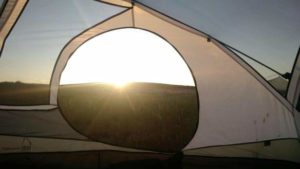 Passion will take you to the wildest places. Exactly one year ago I was returning from orientation at Northern Michigan University. My mind was filled with trivial things like dorm room color schemes. Today, I found myself in eastern Montana trying to convince a bike loaded down with a month’s worth of gear to climb yet another hill. I have quickly discovered that biking gives you lots of time to reflect. Between wind noise and traffic whipping past conversation is not really an option. Honestly, even if there had been no traffic or breeze I don’t believe I could’ve managed a conversation while gasping for breath. So during today’s 27 miles my mind was filled with the obscureness of the situation I have so willingly thrown myself in.
Passion will take you to the wildest places. Exactly one year ago I was returning from orientation at Northern Michigan University. My mind was filled with trivial things like dorm room color schemes. Today, I found myself in eastern Montana trying to convince a bike loaded down with a month’s worth of gear to climb yet another hill. I have quickly discovered that biking gives you lots of time to reflect. Between wind noise and traffic whipping past conversation is not really an option. Honestly, even if there had been no traffic or breeze I don’t believe I could’ve managed a conversation while gasping for breath. So during today’s 27 miles my mind was filled with the obscureness of the situation I have so willingly thrown myself in.
When I signed up for the Wild Rockies Field Institute’s Cycle the Rockies course I had never been to Montana, never bike toured, and my camping experience was limited to weekend excursions and car camping. Heck, when I paid my tuition for the course I didn’t even have a working bicycle. Now I am four days into this trip with roughly 670 miles laying before me. As much as I look forward to the biking and camping ahead, this is an academic course. So in the past 82 hours I have received a crash course in Montana’s coal industry, utility business and environmental activism.
As a native Michigander, coal is somewhat of a theoretical natural resource to me. I know that I’m dependent on coal for electricity. I know that a transition to solar and wind power are needed to cut carbon emissions. However, never before have I considered the impacts of domestic and global coal markets, railroads, bankrupt corporations giving executives golden parachutes. There’s enough jargon and complex policy to make your head spin. I often found myself wondering how on earth someone who lives in Montana — someone with a full-time job and family to take care of — stays informed and active on the so many energy-related issues here.
Today, the coal industry is on the ropes. The largest companies, many of which operate in the Powder River Basin, in Montana and Wyoming, have filed for bankruptcy. Coal is piling up at mines because it can’t be sold profitably. Coal-fired power plants are shutting down left and right due to cheaper natural gas and the steady growth of renewables.
The sun continues to shine and the wind is always blowing somewhere. I understand that I need coal to form the steel that makes my bike frame that allows me to ride 700 miles through Montana and study energy production, consumption and policies in the field. However, there needs to be a plan in place for the transition from fossil fuels to renewable energy. That is the way that the markets and energy industries are going. We need solar power and wind turbines scattered throughout the landscape so energy is always going onto the grid.
For right now, my mind is filled with thoughts about what I can do to encourage the transition from fossil fuels to renewable energy resources so energy-rich places like Montana can move beyond crippling boom-and-bust cycles and protect this landscape. I have hope, maybe only because at 19 years old I am still foolishly optimistic. I am confident in the people’s passion for environmental change that is stopping useless railways from being built, renewing the soil, protecting the aquifers and keeping corporations accountable for their environmental impacts.
One Reply to “Olivia Walcott: From Michigan to Montana”
Comments are closed.
Olivia – we are talking about these issues in the Upper Peninsula this week! http://www.cuppad.org/smart-solutions-for-the-u-p/
This link takes you to the flyer and registration about the meeting on energy transition in the UP
Let’s talk when you get back to NMU – Jenn Hill, Superior Watershed Partnership. jenn (at) superior watersheds (.) org.
Have a great trip!
Jenn Hill